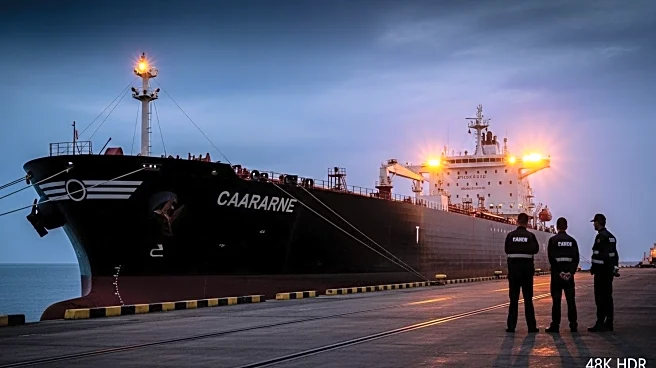What's Happening?
Russian authorities have detained a tanker named Unity in the port of Murmansk due to unpaid crew wages and other issues, according to the Russian Seafarers’ Union. The vessel, part of a shadow fleet sanctioned by Western countries, has been managed by a UAE-based company and has changed its registry multiple times since 2021. The crew, consisting of 20 members, is owed nearly $90,000 in back pay, with additional claims for compensation related to sailing through pirate danger zones. Concerns have been raised about the legal ownership of the vessel, as its registry and ownership details have changed, potentially invalidating crew contracts. The port control inspection confirmed several violations, leading to the detention of the vessel until discrepancies are resolved.
Why It's Important?
The detention of the Unity tanker highlights ongoing issues within the maritime industry, particularly concerning the treatment and payment of crew members. This incident underscores the complexities of managing vessels within the shadow fleet, which often involves frequent changes in registry and ownership to evade sanctions. The broader implications include potential disruptions in the Russian oil trade, as the tanker is involved in transporting oil from Murmansk. Additionally, the situation reflects wider economic challenges in Russia, where unpaid wages have reportedly doubled over the past year, exacerbated by high interest rates from the Central Bank. This could impact the ability of businesses to secure loans for operational expenses, further straining the economy.
What's Next?
The Russian Seafarers’ Union is actively involved in addressing the crew's grievances, and further inspections are likely to ensure compliance with maritime regulations. The vessel's management may face legal challenges if crew contracts are deemed invalid due to changes in registry and ownership. The situation may prompt increased scrutiny of the shadow fleet's operations and its impact on international trade. Additionally, the Russian government may need to address the broader issue of unpaid wages across various sectors, potentially leading to policy changes or financial interventions to support affected workers.
Beyond the Headlines
The detention of the Unity tanker raises ethical concerns about the treatment of maritime workers and the responsibilities of shipping companies in ensuring fair labor practices. The frequent changes in registry and ownership to avoid sanctions highlight the legal loopholes exploited by the shadow fleet, posing challenges for international regulatory bodies. This incident may lead to increased calls for transparency and accountability in the maritime industry, as well as discussions on the effectiveness of sanctions in curbing illicit trade activities.











